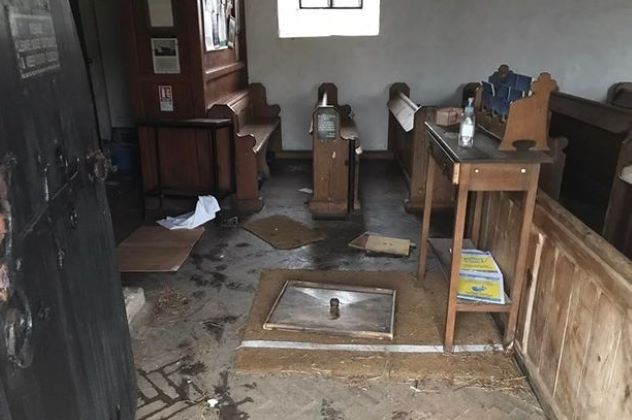 History
History  History
History  History
History 10 “Modern” Problems with Surprising Historical Analogs
 Health
Health 10 Everyday Activities That Secretly Alter Consciousness
 History
History Top 10 Historical Disasters Caused by Someone Calling in Sick
 Animals
Animals 10 New Shark Secrets That Recently Dropped
 Movies and TV
Movies and TV 10 Forgotten Realities of Early Live Television Broadcasts
 Technology
Technology 10 Stopgap Technologies That Became Industry Standards
 Weird Stuff
Weird Stuff 10 Wild Facts About Taxidermy That You Probably Didn’t Know
 Travel
Travel 10 Beautiful Travel Destinations (That Will Kill You)
 Miscellaneous
Miscellaneous 10 Modern Marriage Rituals Born from Corporate Branding
 History
History 10 Extreme Laws That Tried to Engineer Society
 History
History 10 “Modern” Problems with Surprising Historical Analogs
 Health
Health 10 Everyday Activities That Secretly Alter Consciousness
Who's Behind Listverse?

Jamie Frater
Head Editor
Jamie founded Listverse due to an insatiable desire to share fascinating, obscure, and bizarre facts. He has been a guest speaker on numerous national radio and television stations and is a five time published author.
More About Us History
History Top 10 Historical Disasters Caused by Someone Calling in Sick
 Animals
Animals 10 New Shark Secrets That Recently Dropped
 Movies and TV
Movies and TV 10 Forgotten Realities of Early Live Television Broadcasts
 Technology
Technology 10 Stopgap Technologies That Became Industry Standards
 Weird Stuff
Weird Stuff 10 Wild Facts About Taxidermy That You Probably Didn’t Know
 Travel
Travel 10 Beautiful Travel Destinations (That Will Kill You)
 Miscellaneous
Miscellaneous 10 Modern Marriage Rituals Born from Corporate Branding
10 Wonderful Acts of Kindness, Bravery and Goodness That Will Give You Hope
Hate and fear aren’t just terrible because of the effect they have on our society—they’re easy, natural even. They’re deeply coded in every one of us, little switches saving us from coiled snakes on branches and the possible diseases brought to our camp by a foreign tribe. In this day and age, however, these once-necessary instincts often cause more trouble than they prevent. Still, it seems that suspicion, animus, and coercive control are an adjacent pandemic running amok all over the globe.
There are examples that, when learned about and kept in mind, offer a different point of view—an inoculation against hate, apathy, and nihilism, if you will. Here are 10 such stories: two jabs and 8 boosters against the darkness.
Happy New Year, Listversians—let’s hope 2022 gives us many more stories like the ones listed here.
Related: 10 Heartwarming Stories To Restore Your Faith In Humanity
10 The Lichfield Legend
“No good deed goes unpunished.” Sardonic cynicism aside, there is a practical method to overcome this possibility—just keep doing the good deed. This seems to be what one absolute gem of a young man in the Midlands of England has decided to do.
Eighteen-year-old Sebbie Hall from Lichfield, Staffordshire, found that the thought of people being unable to communicate during lockdown due to a lack of available tech really bummed him out. His first act of kindness was to donate his iPad to a close friend of his so they could communicate online. This selfless act snowballed, and to date, Sebbie has helped raise around $53,000 for good causes and directly helped around 2,000 people.
There has been an upside for Sebbie, too, aside from the warm glow of helping others; Sebbie has a rare chromosomal alteration that causes physical and learning disabilities—his daily random acts of kindness have boosted his confidence and helped with his verbal communication.[1]
Some people are just good—and thank goodness for people like Sebbie.
9 Mind-Changer In Chief
People often feel as though they are their opinions, weaving their experience, rationalizations, and second-hand takes into their identity. Extreme, socially gauche/transgressive, and hateful ideologies are often the hardest positions to get away from when one becomes entrenched in such a lifestyle. Such positions, given the social pressure (and even legal status), will create circular logic around the core beliefs to keep individuals “on a side,” so to speak. Cults, for instance, work in a very similar way. That’s what makes Daryl Davis such an exceptional person.
Over the course of the last few decades, Davis has helped reform over 200 KKK members—simply by acknowledging their humanity and showing them that he, in fact, shares that humanity too. And playing a mean piano.
From convincing a “Grand Cyclops” to hand over his robes to working closely with the decentralized social media platform Minds as a consultant on “deradicalization” (as opposed to Twitter, which seems to rely on their executives’ super worldly “experience” in Silicon Valley and Ivy League schools), Davis has dedicated a huge chunk of his life to effecting actual change, not merely virtue signaling.[2]
8 Lazy Teens? Not So Much
A group of high school kids stop jerking around and band together to do a good deed for someone in need—seems to be a plot from a mid-season episode of an early 1990’s teen sitcom. Thankfully, this kind of stuff does happen IRL…minus the laugh track and attractive 28-year-old woman pretending to be “the nerdy girl” in school.
Students in Bradford, Rhode Island, couldn’t abide the thought of 5-year-old Ryder Killam getting soaked through every school day. You see, little Ryder had to spend about 15 minutes exposed to the elements every morning as he waited for the bus. His dad hitched a patio umbrella at his bus stop, an accouterment that did little to protect Ryder from snow, hail, and rain. Local teens noticed the boy sitting in his wheelchair at the stop every morning (Ryder has spina bifida) and decided to build him a shelter. Ryder now gets to school without sodden clothes and a runny nose, allowing him to focus fully on his studies, really knuckle down, and truly listen to whatever his teacher is droning on about. Well, every story has a downside, I guess.[3]
7 Generating Not Degradation
This is a nice, short, uplifting entry. Iconic red telephone boxes (and the far less iconic 1980s grey metallic ones) covering the length and breadth of Britain are quickly being repurposed instead of being let to slowly rust and decompose. Some have been turned into comfy little reading rooms for one, mini nightclubs, and even coffee bars. The main repurposing job seems to be defibrillator machine stations, a service that will hopefully save as many lives as the phone boxes did in the pre-cell phone days.
Now, some teens are intent on destroying them before they get reused (not-the-nice ones-from-Rhode-Island-who-build-bus-shelter-types). Who will win? Do-gooders who enrich our lives, or the memester sprogs who will fill the boxes with expanding builder’s foam or inflatable penises (whose exploits enrich some of our lives)? Let the games begin.[4]
6 Prayers Answered…Very Quickly

One can understand (and obviously condemn) ideologically possessed asshats who burn down churches and cathedrals. One can even understand a group of edgy goths vandalizing a parish church with some black paint daubing of some sub-Hammer-Horror-movie slogans and symbols.
For lulz.
But who in their right mind would desecrate this charming little chapel in rural West Wales? That’s the thing—nobody with a “right mind” could do such an awful thing.
This wanton vandalism to the beautiful Capel y Grog in Mwnt, Ceredigion, in late 2021 shocked the local community. They quickly went about setting up a fundraising goal of £20k online, hoping they could restore their place of worship.
They hit their target after just three days. Senseless hate will never win against kindness and charity.[5]
5 One Hell of a Tip
An often-overlooked positive facet of everyday life is good service from those who are paid to provide it. So when you encounter a person in a shop or a restaurant who treats you less like a guest or a customer and more like a friend or a family member, really caring that you “have a nice day,” it can be amazing.
That’s what Dunkin’ Donuts server Ebony Johnson did every single day. In a job that can, if seen as just a means to earn money to live, be a repetitive, unfulfilling drudge, Ebony used her time to spread kindness and enquire and learn about the people she served. To care. And one customer reciprocated in a big way.
Suzanne Burke placed an order at the drive-thru with Ebony every morning. They chatted and became friendly over a three-year period. When Ebony fell on hard times, getting evicted from her home in Mount Healthy, Ohio, Suzanne took the chance to pay her back for the years of friendliness, kindness, and joy that Ebony had provided her. She gave her a tip for the ages. Suzanne organized for Ebony to move into a new, fully furnished home with her three kids in time for Christmas.[6]
4 Spreading the Luck
Playing the lottery is dumb. Unless you win the jackpot, of course. Unbelievable wealth, however, is often a dangerous thing to foist upon an unwitting individual. Almost nobody strategizes and conducts some financial planning while standing in the queue at the grocery store, ready to buy a ticket. Thus, many winners fall into a cycle of excess and squandering, leaving their mental and physical health in tatters.
You’ve probably heard the story before—young man from rough background wins lottery, spends it all on drugs, parties, and gambling, and *enter terrible outcome to end a sad tale*. You may also think it’s unreasonable to expect that a random, normal person should be expected to become a financial whizz simply because they could find themselves in the 1% (or even in the 1% of the 1%).
Hey, there’s always charity.
In 2018, Barbara Wragg of Sheffield, England, passed away. Nearly two decades earlier, she had won the National Lottery, a jackpot of £7.6 million. Over the period of this sudden wealth, she and her husband gave away around 70% of the winnings. She maintained a humble lifestyle (save a bigger house and a nicer car), using the cash as a buffer rather than a means of buying shiny, fast, or intoxicating things. The rest went to numerous charities.
Among many other causes, Bluebell Wood Children’s Hospice, the Make-a-Wish Foundation, Whirlow Hall Farm Trust, the Meningitis Trust, and Help the Aged all benefited from Barbara’s windfall. She also paid for 250 kids from Sheffield’s impoverished inner city to attend the local Christmas pantomime every year. When a group of WWII veterans couldn’t afford to visit Monte Cassino in 2004 for the 60th anniversary of the battle, in came Barbara.
Good things happening to good people will make goodness proliferate: “Winning the lottery changed our lives but not our persons.” May she rest in peace; God knows she deserves it.[7]
3 The Life Ranger
“I’m the chotto matte man,” retired police officer Yukio Shige told Japan Today in 2014. “Chotto matte” means (roughly) “please wait a moment.” When you consider that this septuagenarian patrols a suicide hotspot on Japan’s coast, this simple, courteous phrase gains a huge weight.
“Please, wait a moment” saves lives. Yukio Shige saves lives.
But it’s more than that; he goes on to extrapolate as to his method in the article. “There’s only one way to deal with this,” Shige emphasizes to Shukan Shincho. “You yourself must help them get back on their feet, work with them to solve their problems. If they’re in debt, I take them to legal aid people; if they’re out of work, I take them to the Hello Work employment agency; if they’re homeless, I take them home with me.” If it’s trouble at work, he goes to the person’s workplace and tries to sort things out.
It’s not just about taking the time to consider waiting for a moment; Shige himself takes the time to actively help desperate individuals. Yukio Shige himself practices what he preaches—”Chotto Matte.” He’s willing to take the time too. He has a team of volunteers that patrol the Tojinbo Cliffs and runs a small hostel nearby. By 2017, it was estimated that 500 lives had been saved by his efforts. By now, many more will have been saved.[8]
This is a man who holds that life is precious despite the inevitable suffering that occurs during its course.
Arigato gozaimasu, Shige-san
2 Olympic Silver, Kindness Gold
When Olympic athlete Maria Anrejczyk heard of a family who was struggling to raise funds to save their baby, she knew what to do. The Polish javelin chucker grew worried that the family of baby Milosz Malysa wouldn’t hit their goal of 1.5 million zlotych, the amount needed to get the infant life-saving heart surgery in Barcelona, Spain.
In an act of sheer selflessness, the athlete auctioned her Olympic silver medal. Half of the total goal had been reached already, and time was running out for baby Milosz. At the last moment, Polish supermarket chain Zabka offered the outlying amount for the medal. Milosz went on to get his surgery and, moreover, Maria got to keep her medal after all![9]
Maria added: “I will be eternally grateful. I have no words to express how happy I am.”
1 Mending Deep Scars
A man who spent a year in prison on a false charge proved himself a hero in 2020. After a jury finally acquitted Daylan McLee of pointing a gun at an officer during a traffic stop in Pennsylvania, he harbored some animus for law enforcement. Who could blame him? This didn’t stop McLee from saving a police officer’s life by pulling him from a burning squad car.
He could have stood and watched; he could have filmed it and posted it online. He could have just called for the emergency services and gone about his day. But Daylan stepped up, put his past experiences aside, and did as good a deed a person can do. Daylan McLee shows us that when we are willing to recognize the basic humanity inherent in all our fellow men, hate cannot prevail.
“I want people to start looking at people as Americans, and not, you know, ‘he’s white, he’s black, he’s Asian’—we’re people, and when we start realizing that, things should get better”—Daylan McLee, 2020. [10]








